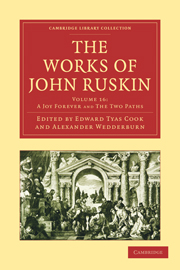Book contents
- Frontmatter
- Contents
- LIST OF ILLUSTRATIONS
- INTRODUCTION TO THIS VOLUME
- PART I “A JOY FOR EVER” BEING THE SUBSTANCE (WITH ADDITIONS) OF TWO LECTURES ON THE POLITICAL ECONOMY OF ART (1857, 1880)
- BIBLIOGRAPHICAL NOTE
- PREFACE (1857)
- PREFACE (1880)
- Contents
- TEXT OF ALL THE EDITIONS
- PART II INAUGURAL ADDRESS AT THE CAMBRIDGE SCHOOL OF ART (1858)
- PART III THE OXFORD MUSEUM (1858, 1859)
- PART IV “THE TWO PATHS” (1859)
- APPENDIX: ADDRESSES AND LETTERS 1856–1860
- Plate section
PREFACE (1880)
Published online by Cambridge University Press: 07 September 2011
- Frontmatter
- Contents
- LIST OF ILLUSTRATIONS
- INTRODUCTION TO THIS VOLUME
- PART I “A JOY FOR EVER” BEING THE SUBSTANCE (WITH ADDITIONS) OF TWO LECTURES ON THE POLITICAL ECONOMY OF ART (1857, 1880)
- BIBLIOGRAPHICAL NOTE
- PREFACE (1857)
- PREFACE (1880)
- Contents
- TEXT OF ALL THE EDITIONS
- PART II INAUGURAL ADDRESS AT THE CAMBRIDGE SCHOOL OF ART (1858)
- PART III THE OXFORD MUSEUM (1858, 1859)
- PART IV “THE TWO PATHS” (1859)
- APPENDIX: ADDRESSES AND LETTERS 1856–1860
- Plate section
Summary
The title of this book, —or, more accurately, of its subject;—for no author was ever less likely than I have lately become, to hope for perennial pleasure to his readers from what has cost himself the most pains, —will be, perhaps, recognised by some as the last clause of the line chosen from Keats by the good folks of Manchester, to be written in letters of gold on the cornice, or Holy rood, of the great Exhibition which inaugurated the career of so many, —since organized, by both foreign governments and our own, to encourage the production of works of art, which the producing nations, so far from intending to be their “joy for ever,” only hope to sell as soon as possible. Yet the motto was chosen with uncomprehended felicity: for there never was, nor can be, any essential beauty possessed by a work of art, which is not based on the conception of its honoured permanence, and local influence, as a part of appointed and precious furniture, either in the cathedral, the house, or the joyful thoroughfare, of nations which enter their gates with thanksgiving, and their courts with praise.
“Their” courts—or “His” courts;—in the mind of such races, the expressions are synonymous: and the habits of life which recognise the delightfulness, confess also the sacredness, of homes nested round the seat of a worship unshaken by insolent theory: themselves founded on an abiding affection for the past, and care for the future; and approached by paths open only to the activities of honesty, and traversed only by the footsteps of peace.
- Type
- Chapter
- Information
- The Works of John Ruskin , pp. 11 - 12Publisher: Cambridge University PressPrint publication year: 2010First published in: 1905

